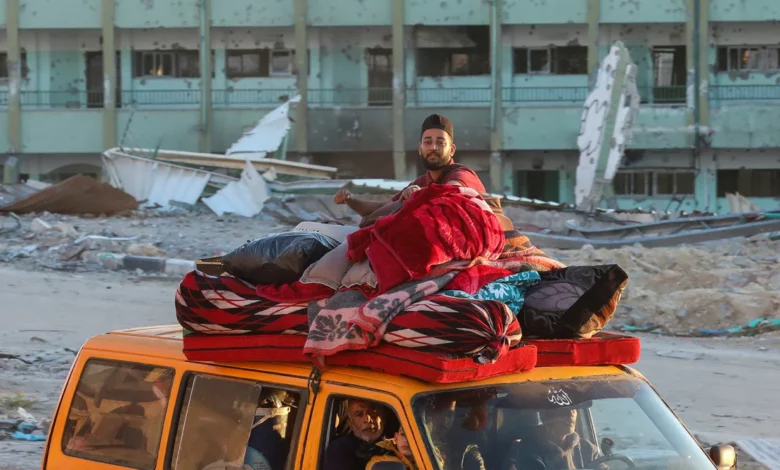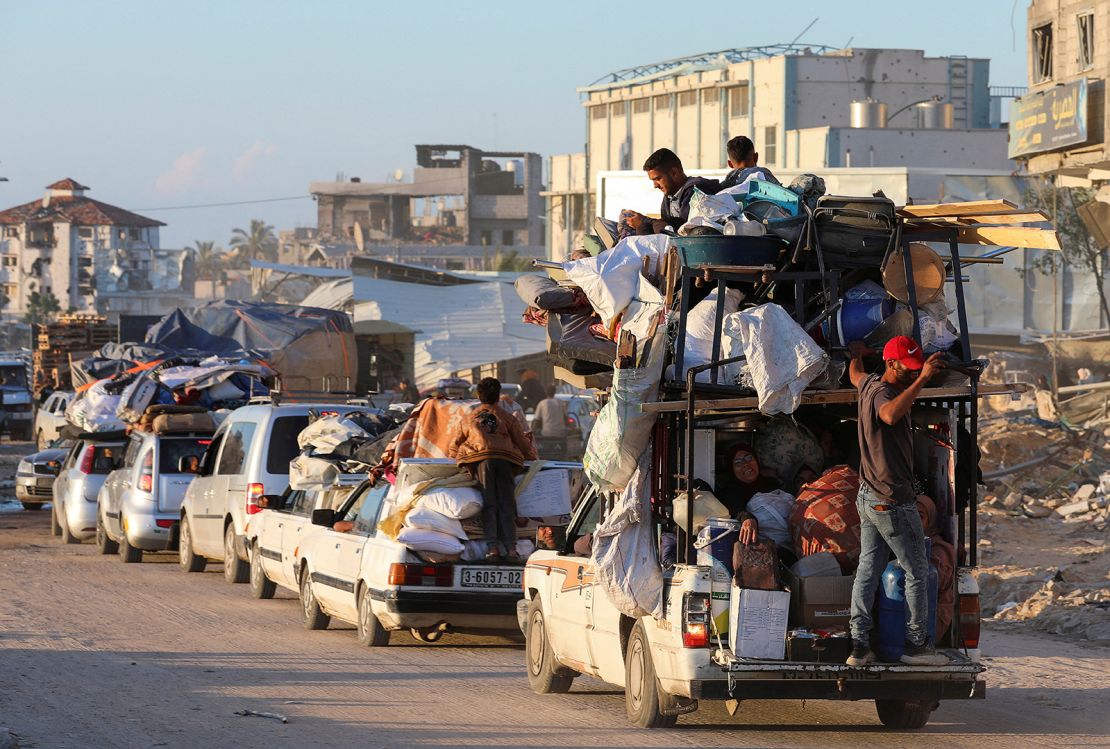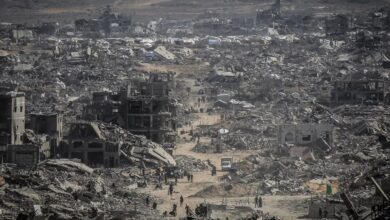
“We left because they distributed leaflets,” Mohammed Ghanem, a resident in eastern Rafah told a CNN stringer in the area on Monday. “(They) are striking everywhere without differentiating between children, adults, militants or non-militants. I left my house that I have been building for 17 years,” he added.
Ghanem and his wife were pushing strollers piled high with belongings. “We no longer have a home. We are heading to Mawasi because there is no safety with the Israelis. They are killing women and children.”
Another woman from eastern Rafah said, “The Israelis sent us messages ordering us to leave. We cannot stay.”
Earlier on Monday, the Israeli military called on an estimated 100,000 Palestinians living in parts of eastern Rafah to “evacuate immediately,” telling them to move to Al-Mawasi, a coastal town near the city of Khan Younis that aid groups say is not appropriate for habitation.
In a statement, the office of Israel’s prime minister said the country’s war cabinet had “unanimously decided” to continue with the Rafah operation “to exert military pressure on Hamas.”
The current war began on October 7 when Hamas militants killed more than 1,200 people in southern Israel and took more than 200 people hostage.
In the almost seven months since, Israel’s military bombardment of Gaza has killed more than 34,600 people, according to the Gaza health ministry, and driven more than 1 million Palestinians to seek refuge in Rafah, a city that the medical NGO Medicines San Frontieres said was absent of the “necessary conditions for survival.”
A CNN stringer in Rafah’s east said that people were terrified and in a state of panic following Monday’s evacuation announcement, which sparked a flurry of appeals from world leaders, the United Nations, and humanitarian groups urging Israel not to carry out its long-threatened assault on the city as ceasefire and hostage negotiations with the militant group fell short.
The move was described as “inhumane” by United Nations human rights chief Volker Türk and “beyond alarming” by the Norwegian Refugee Council.
The Israel Defense Forces said Monday it was “currently conducting targeted strikes against Hamas terror targets in eastern Rafah in the southern Gaza Strip.”
Video and images from eastern Rafah showed trucks full of people’s belongings driving through the streets, which became increasingly crowded as Monday wore on. Children were seen sitting among tanks of fuel and plastic bags filled with possessions, and families left with mattresses strapped to the roof of their cars.
Faisal Barbakh, who fled on his bicycle, said he is leaving a lifetime of memories behind.
“I am leaving for the unknown. I feel terrible. I just wish one of the people who caused us this were walking with us,” he said.
“I’m carrying all of my life here. My family is torn in seven places. I feel it’s the end of life. I can’t think anymore. I left 59 years of life behind, all of my memories, my children’s pictures, the contract of my house. Only God knows how much effort I have put in there. It is not only my feeling, it is everyone’s feeling.”
Many of those leaving eastern Rafah have been previously displaced multiple times as Israel’s focus moved from city to city.
“This is the fourth time I’m being displaced. From Nuseirat to Khan Younis, then to Rafah, and now another one. I don’t know where I am heading,” one man told CNN.

On Tuesday, the Israeli military said it had taken control of the Gazan side of the Rafah crossing, a crucial entry point for humanitarian aid on the enclave’s southern border with Egypt.
“We have operational control of the area and the crossing,” an Israeli military official said during a briefing with reporters.
Wael Abu Omar, a spokesperson for the General Authority of Border and Crossing, told CNN that all movement and aid shipments through Rafah had stopped “after Israeli tanks captured the crossing facilities from the Palestinian side.”
In recent months, Israeli strikes have further deteriorated conditions for those living and sheltering in the city, including an estimated 600,000 children. Malnutrition is rapidly spreading and medical facilities are “rendered ineffective by the Israeli authorities’ siege,” Medicines San Frontieres said.
The UN Children’s Fund (UNICEF) said “Rafah is now a city of children, who have nowhere safe to go in Gaza.” An Israeli ground incursion “would pose catastrophic risks” to the already injured, sick, malnourished, and traumatized people who have no safe place to go, it said.
Two boys, Malek and Yousef, were making their own way of Rafah out on bicycles Monday, clinging to their bags.
“We are running away from the Israelis. They warned us and ordered us to evacuate the eastern area. I have my clothes and food in the bag. We are going to our grandparents’ house,” one said.
The Israeli military directed people to Al-Mawasi, narrow, coastal area that has been designated by Israel as an “expanded humanitarian area.”
In Al-Mawasi, already crowded with displaced people, some of the new arrivals appeared confused and disorientated. The streets were packed with trucks and donkey carts, surrounded by huge piles of garbage.
“I came here from Rafah and didn’t find any place to stay. People even say we should leave [here]. I swear, I don’t know where to go. They distributed leaflets, and people panicked and started running away,” said Mohammad Abu Khamash.
The main UN agency for Palestinian refugees (UNRWA) has warned that Al-Mawasi is not appropriate for habitation.
“It’s really not somewhere that’s quite suitable for people to put up tents and to be able to sit and try to live and meet their basic necessities every day,” Scott Anderson, Director of UNRWA affairs in Gaza, told CNN Monday.
Jan Egeland, Secretary General of the Norwegian Refugee Council, said in a statement that the evacuation order was unlawful and Al-Mawasi “is already overstretched and devoid of vital services.”
“It lacks the capacity to house the number of people currently seeking refuge in Rafah, with no assurances of safety, proper accommodation or return once hostilities end for those forced to relocate,” he said.
Many of those fleeing on Monday said that there is nowhere safe for them and their families.
“We had to endure airstrikes that put our lives and our children’s lives at risk. We left in search of a bit of dignified life that we can live with our families,” said Ahmad Safi, who left Rafah for Khan Younis with his family.
Safi said that he searched for water every day.
“There is no life. It is very complicated. I came to Khan Younis and I felt so depressed. It was a city full of life and happiness, but now it is not even suitable for living. We are eight family members. We came on a cart from Rafah. I am still in shock that we left Rafah.”
“There is no safety anywhere. The Israelis can enter at any time wherever they want,” he added.
And as people in Rafah fled, Israel carried out new strikes on the city.
In the latest update, Israeli airstrikes on Rafah overnight killed 15 people, including a child, according to hospital officials in southern Gaza on Tuesday.
Strikes in Rafah late Sunday night into the early hours of Monday killed least 26 people, according to the Palestinian Civil Defense.
Rafah resident Abu Salah said that he had left the city under heavy Israeli fire.
“There is no safety. Safety is being at my home. Is safety being displaced from place to place like a cat with its children, begging for a bit of water and a coupon [for food]?” he said.
A woman called Maha said Palestinian civilians were at the mercy of the Israeli military.
“They can tell you to go here and kill you here, or they tell you to go there and they kill you there. They don’t want safety for us,” she said.
“The solution is to finish this cause, not only to stop the war, but to have a Palestinian state,” she added.
This story has been updated with additional details.
CNN’s Eve Brennan, Mia Alberti, Magdi Abdelhadi, Richard Roth, Sarah El Sirgany, Jomana Karadsheh contributed to this report.




